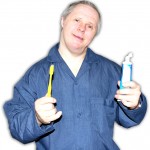 People with Down syndrome often have orofacial difficulties (a term that relates to the mouth and face) which can affect speech, swallowing and dental health. The Journal of Disability and Oral Health has recently published two reviews looking at this issue.
People with Down syndrome often have orofacial difficulties (a term that relates to the mouth and face) which can affect speech, swallowing and dental health. The Journal of Disability and Oral Health has recently published two reviews looking at this issue.
The first looked at Orofacial regulation therapy (OFRT), developed in the 1970s by Castillo-Morales, often including the use of a palatal stimulation plate, a removable orthodontic device.
The authors looked articles from 1990 which explored the use of Palatal Plate Therapy by dentists in patients with Down syndrome. They wanted to know what role there may be for dentists in managing orofacial dysfunction and what further research may be necessary.
What they fund was significant limitations in the data due to poor study design and patient factors. There were few papers describing randomised control trials and baseline data in the studies were often found to be inconsistent. The lack of a control groups was a significant shortcoming. In some studies, parents of children refused to enrol them in non-treatment groups. In addition, it was difficult to use placebo plates as foreign body stimulus in the mouth of participants provoked reactions.
The authors also found that because of high dropout rates, it was difficult to come to a view about long term outcomes.
They conclude that the results of studies they reviewed ‘inferred a significant positive impact on patient’s lives with Down syndrome.’
They recommend however that larger multi-centre research be carried out, with standardised objectives, clear inclusion and exclusion criteria and the use of reproducible methodology in order to produce more statistically significant and valid results.
A critical appraisal of the literature on Palatal Plate Therapy for orofacial dysfunction in patients with Down syndrome, Pritchard M et al., in Journal of Disability and Oral Health, 14, 1, 5-14
